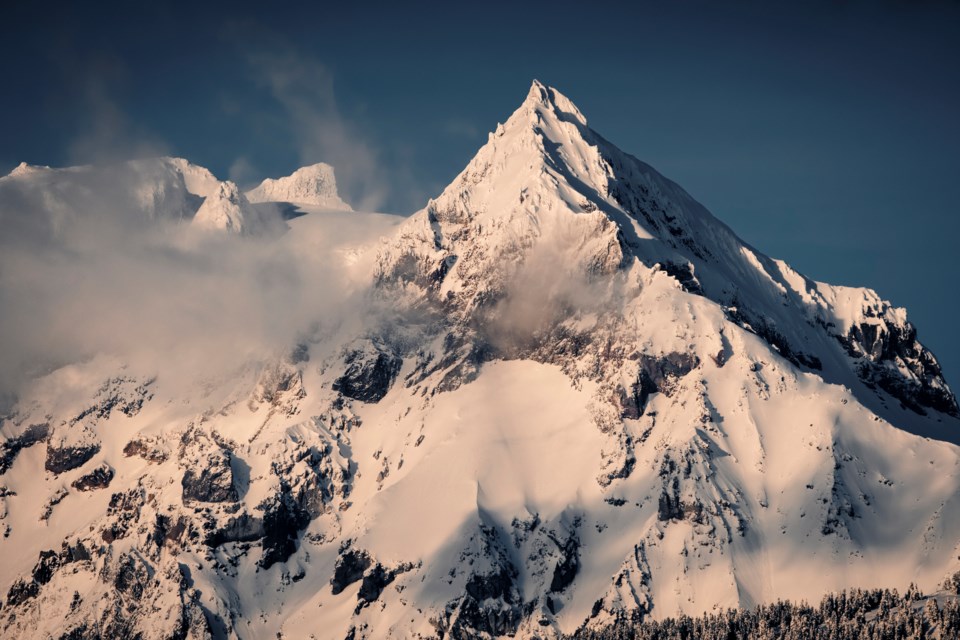Squamish council members have voiced their support for officially changing the name of Mount Garibaldi to its Sḵwx̱wú7mesh Úxwumixw (Squamish Nation) name, Nch’ḵay̓.
At the Oct. 3 regular business meeting, council voted unanimously to write a letter of support to the B.C. Geographical Names Office regarding the request by Squamish Nation to change the name of the prominent Sea to Sky geological feature.
This local feedback stemmed from a letter from the provincial names office asking the District for its comments regarding the proposed change.
“I see this as a reconciliation measure to contemplate and, I hope, eventually rename the peak from Garibaldi to Nch’ḵay̓,” said Coun. John French.
(Nch’ḵay̓ is pronounced in-ch-KAY.)
In addition to its support, council also suggested the B.C. Geographical Names Office refer the proposal to Heritage BC and the National Congress of Italian-Canadians British Columbia Region Society.
Coun. Eric Andersen said this would allow for a “a complete context statement” available when looking up the name in the office’s database if the change were to go ahead.
While discussing the letter, Coun. Chris Pettingill said he wanted council’s response to be “crystal clear” about their endorsement of the Nch’ḵay̓ name.
“A return to the original Indigenous name is really important,” he said.
Another councillor was supportive of the change going beyond just the naming of the mountain, although this is not currently requested.
“As much as I enjoy hearing the history of Garibaldi, I have an even greater appreciation for the representation that this gives the Squamish language, people and culture and I hope that this change eventually goes on to be reflected by BC Parks,” said Coun. Lauren Greenlaw.
Sxwixwtn, Wilson Williams, Nation councillor and spokesperson said that the Mount Garibaldi name change is an “extremely important step forward” for the Squamish People.
“Nch’ḵay̓ has held great significance to us for thousands of years. It is sacred to us. It is the centre of our Creator Legend. It is the highest mountain in our homelands, and it inspires us to strive for greatness,” he said in an emailed statement.
“We have always called the mountain Nch’ḵay̓, but having our language, our culture and our stories finally recognized by others, is wonderful.”
The provincial letter sent to Squamish municipal council noted that that Nch’ḵay̓ means “Dirty Place” or “Grimy one,”in the Squamish language, referring to the tendency for the Cheekye River to look muddy in colour, a result of volcanic debris in the area.
The provincial letter states that the name Mount Garibaldi originates from a ship captain of the Royal Navy commemorating the Italian General Giuseppe Garibaldi in the 1860s.
“It is unlikely that Garibaldi ever visited British Columbia,” the letter reads. “There are 10 other official names which commemorate him in the province, including the prominent provincial park.”
Wilson said that the Nation is working hard to move these kinds of initiatives forward.
“They are extremely important to our community, and to our future. I also believe that in recent years people and other levels of governments are more willing to listen, to work with us, and to effect real change,” he said.
When could we see the name officially change to Nch’ḵay̓?
A spokesperson for the B.C. Geographical Names Office, Corinna Filion, told The Squamish Chief in an email that name changes occur about 10 to 30 times per year on average.
“In 2022, there were 15 geographical name changes, 12 of which were Indigenous names,” she wrote. “In 2021, there were four geographical name changes, three of which were Indigenous names.”
Filion noted there were likely fewer name changes these two years due to the impacts of the pandemic, wildfires and flooding.
“Recognizing Indigenous place names is part of B.C.'s work to advance reconciliation and implement the United Nations Declaration of the Rights of Indigenous Peoples through the Declaration on the Rights of Indigenous Peoples Act.”
Filion said the comment period for the name change is open until Dec. 31 and after it closes the comments will be evaluated in accordance with the Geographical Naming Policy. This process may take several weeks or months, depending on the total number of comments received.
View the comments from the District of Squamish council meeting on the muni’s YouTube page.
Bookmark squamishchief.com so you can return for more local stories like this. Get Squamish news daily in our free newsletter. Sign up here.




